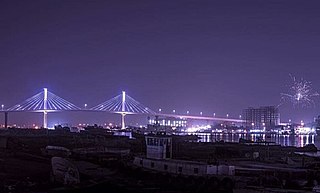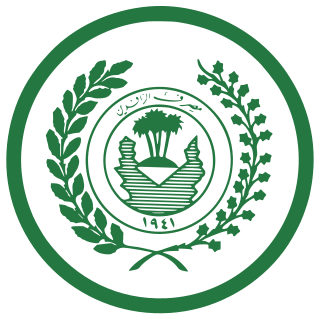
The economy of Iraq is dominated by the oil sector, which has provided about 99.7% of foreign exchange earnings during its modern history. As of 2021, the oil sector provides about 92% of foreign exchange earnings. Iraq's hitherto agrarian economy underwent rapid development following the 14 July Revolution (1958) which overthrew the Hashemite Iraqi monarchy. It had become the third-largest economy in the Middle East by 1980. This occurred in part because of the Iraqi government's successful industrialization and infrastructure development initiatives in the 1970s, which included irrigation projects, railway and highway construction, and rural electrification.
The Rafidain List or Al Rafidain National List is the name of the list that is used by Assyrian Democratic Movement during the Iraqi elections, headed by Yunadam Kanna.

The Assyrian Patriotic Party is a political party in Iraq representing Assyrians that has been led by Emanuel Khoshaba Youkhana, since the 4th APP conference in Duhok in 2011. In 2018 they allied with the Assyrian Democratic Movement in a political group called the National Rafidain List for the 2018 Iraqi parliamentary election.

The Iraq Football Association (IFA) is the governing body of football in Iraq, controlling the Iraqi national team and the Iraqi football league system. The Iraqi Football Association was founded in 1948 and has been a member of FIFA since 1950, the Asian Football Confederation since 1970, and the Sub-confederation regional body West Asian Football Federation since 2001. Iraq is also part of the Union of Arab Football Associations and the Arab Gulf Cup Football Federation. The Iraqi team is commonly known as Usood Al-Rafidain, which literally means Lions of Mesopotamia.

Al-Mansour or just Mansour is one of the nine administrative districts in Baghdad, Iraq. It is in western Baghdad and is bounded on the east by al-Karkh district in central Baghdad, to the north by Kadhimiya, to the west by Baghdad International Airport, and to the south by Baghdad Airport Road, on the other side of which is al-Rashid district.
Al-Rafidain University College is a private academic institution in higher education of public interest established on November 23, 1988. It was founded byThe Iraqi Society for Statistical Sciences. The actual work study started in 1988/1989 and is considered one of the oldest private academic colleges in Iraq. The college awards bachelor's degrees in various scientific disciplines and is subject to the laws, regulations, instructions and regulations of the Ministry of Higher Education and Scientific Research through direct scientific and educational supervision on its various activities. Granted by the college recognized by that ministry.

Rafidain Bank is the largest bank in Iraq, with 165 branches inside Iraq as well as branches in London, Cairo, Beirut, Abu Dhabi, Bahrain, Amman and Jabal Amman. Its headquarter is in central Baghdad. The bank was established in 1941 and became a state-owned bank in the 1960s wave of Ba'ath nationalisation. In 1988, the Rafidain's non-performing assets were carved out into the Rasheed Bank.
Rasheed Bank is the second largest Iraqi bank, with 162 branches in Iraq. On January 1, 1989, the Rasheed Bank was spun off from the state-owned Rafidain Bank.
The Ministry of Finance is the cabinet-level ministry responsible for managing the financial affairs of the Government of Iraq. It formulates financial policies, receives and manages all revenues of the state, takes part in drafting the general budget bill, oversees government expenditure, and operates a number of agencies. The two largest banks in Iraq, namely Rafidain and Rasheed, as well several other enterprises, are operated by the Ministry of Finance. It publishes a monthly report called the Open Budget Survey.

Assyrian politics in Iraq have been taking many different turns since the US invasion of the country in 2003. Today, there are many different Assyrian political parties in Iraq. The main Assyrian party that came out from the 2005 elections was the Assyrian Democratic Movement. However, Sarkis Aghajan began to challenge its power beginning in 2006 with the opening of Ishtar TV and the KDP-affiliated Chaldean Syriac Assyrian Popular Council.
Al-Rafidain TV is an Iraq-based Arabic television channel broadcasting from Istanbul, Turkey where its headquarters is located. Launched on 10 April 2006 on Nilesat, the channel is owned by Sunni Arabs and has an anti-Western agenda and supporting Association of Muslim Scholars.

Corruption is pervasive at all levels of government in Iraq. In 2021, President Barham Salih stated that US$150 billion of oil money had been stolen and smuggled out of Iraq in corrupt deals since the 2003 U.S. invasion. Endemic corruption pervades Iraq's oil and gas sectors, which still accounts for more than 99 percent of the country’s exports and 85 percent of the government’s budget. The Iraqi economy is predominantly a cash economy, making it almost impossible to trace the amount or the path the money follows.
The 1973–74 Iraqi National First Division was a football tournament organised by the Iraq Football Association (IFA) in the 1973–74 season, which was formed as the first top-tier national league in Iraq to replace the Iraq Central FA Premier League and the leagues in other provinces such as Basra, Kirkuk and Mosul. The tournament began on 11 October 1973.
Fawzi Abdullah al-Qaisi was an Iraqi economist and academic, born in 1926 and died in 1979.
Al-Rafidain Sport Club is an Iraqi football team based in Al Diwaniyah, that plays in Iraqi Second Division League.
Bilad Al-Rafidain Sport Club is an Iraqi football team based in Baqubah, Diyala, that plays in Iraqi Second Division League.
Hazem Abdullah Khader was an Iraqi historian and researcher who specialized in Andalusian Arabic literature. He has published research is considered one of the Islamic preachers from the Muslim Brotherhood School in Iraq.






